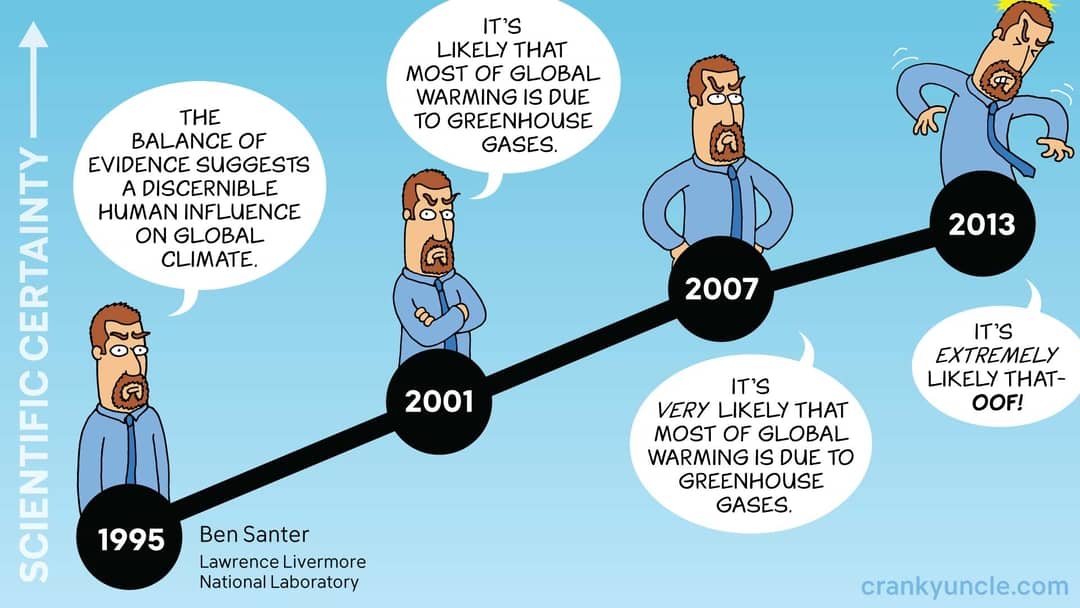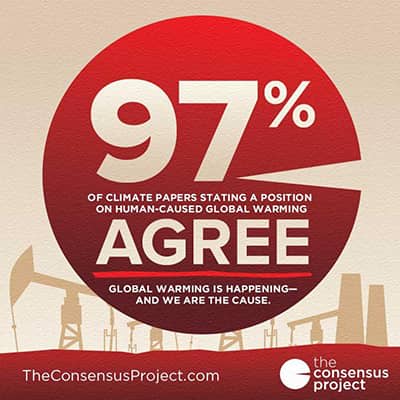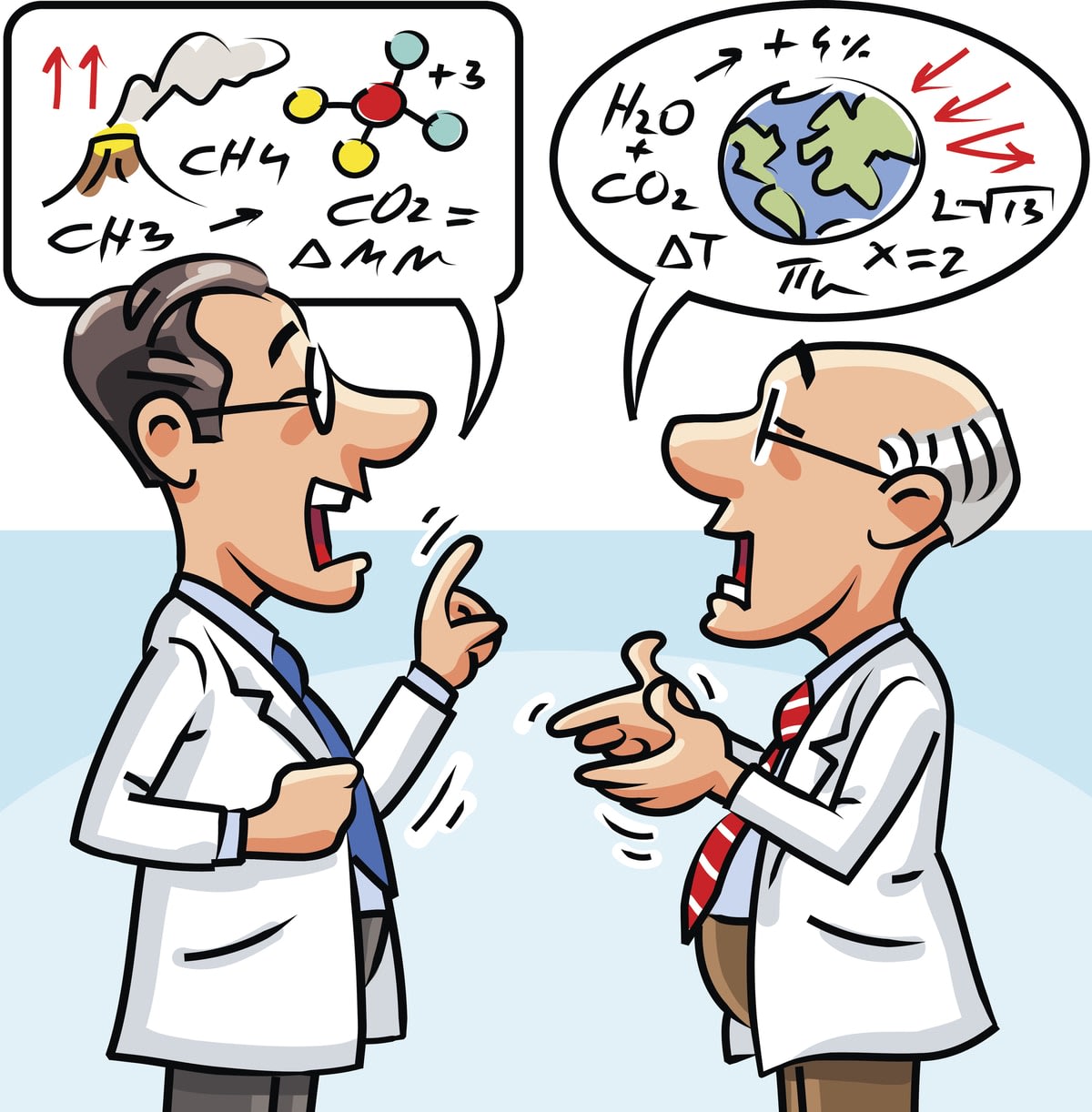
Over time, the scientific consensus on climate change has steadily strengthened as the empirical evidence has piled up.
We see this in the statements of the Intergovernmental Panel on Climate Change. In 1995, it suggested there was a discernible human influence on global climate – at the time it was a bold statement, and forever changed the life of lead author Ben Santer.
From that point, the language steadily strengthened from most of the warming being “very likely” due to human CO? emissions in 2007, to “extremely likely” in 2013.
Earlier this year, the latest IPCC report issued its most definitive statement, concluding that “[i]t is unequivocal that human influence has warmed the atmosphere, ocean and land”.

Another way to quantify the scientific consensus on climate change is by surveying climate scientists.
The first quantification of the consensus among climate experts was published in 2009, by Peter Doran and Maggie Zimmerman. Surveying the Earth science community, they found 80% agreement that humans were causing global warming.
However, the degree of consensus was higher among scientists with greater climate science expertise. Among actively-publishing climate scientists, 97.4% agreed that humans were causing global warming.
Four years later, I published research examining scientific consensus from a different angle.
Building on earlier work by Naomi Oreskes and working with colleagues from the Skeptical Science team, we analysed more than 12,000 abstracts from scientific studies about global climate change. We found that among the 4000 studies that stated a position on human-caused global warming, 97.1% agreed with the consensus position.
What surprised me after this paper came out was how surprised everyone was at the result. “Really? 97%? I didn’t realise it was that high!”
That response took me aback, as we weren’t the first research to find 97% consensus on human-caused global warming. We weren’t even the second (William Anderegg also found 97% consensus in 2010). But the public weren’t yet getting the message.

In 2014, the opportunity arose to interview Doran as part of a Massive Open Online Course about climate change and misinformation. In our conversation, he revealed an eye-opening revelation – whenever he received criticisms of his 2009 study, he simply redirected them to me as the more recent study into scientific consensus. So that’s why I’d been receiving so many criticisms of my research!
This year, I collaborated with Doran and other colleagues from George Mason University and Louisiana State University to publish an updated measure of scientific consensus on climate change. It had been a decade since his 2009 study, and we thought it was time to repeat his survey of the Earth science community – an opportunity to gauge whether there’d been any change in scientific agreement on human-caused global warming.
Our research, published in Environmental Research Letters, found that the scientific consensus had strengthened even further since 2009. Among Earth scientists overall, there was now 91.1% agreement on human-caused global warming, an 11% jump from the 80% figure in 2009.
The headline figure from the 2009 study – 97.4% consensus among climate scientists – had now increased to 98.7% consensus.
Especially interesting was the change in consensus among economic geologists (for example, scientists working for the fossil fuel industry). Back in 2009, only 47% of economic geologists agreed human-caused global warming was happening. Now, the level of agreement has nearly doubled to 84.1%.
This happily casts some doubt on the old saying that it’s difficult to get a person to understand something when their salary depends upon them not understanding it. It is possible, when the scientific evidence becomes overwhelmingly strong.

Another group in which there was a large shift in opinion was meteorologists – from 64% in 2009 to 91% in our new study.
This is a welcome trend, with real-world implications. TV meteorologists inhabit a climate communication sweet spot – highly skilled communicators who are a trusted source of information about climate change while being watched by millions.
Their growing acceptance of human-caused global warming has paved the way for weathercasters raising public awareness of the reality of climate change through programs such as Monash’s Climate Communicators and George Mason University’s Climate Matters.
Read more: Fighting back against climate misinformation, and the damage being done
As well as investigating the change in consensus over time, we also examined how consensus varies depending on expertise. Multitudes of studies have found that the greater the expertise in climate science, the higher the agreement on human-caused global warming.
Our study replicated this result, using a variety of measures to quantify expertise in climate science. Whether it was the number of years spent working on climate change, or the number of published studies about climate change, the same pattern emerged. The more you know about climate science, the more likely you are to understand that humans are responsible for climate change.
This strengthening consensus among the scientific community – even among traditionally sceptical fields – is also reflected in other parts of society that have in the past been resistant to accepting climate science.
News Corp recently endorsed the goal of Australia achieving net zero emissions by 2050, a striking development given its outlets have been a prolific source of climate misinformation.
Similarly, mining magnate Andrew Forrest recently urged Australia to move away from a reliance on fossil fuels. Perhaps this position is due to his conversations with all the economic geologists who are now convinced about human-caused global warming.
This article was first published on Monash Lens. Read the original article
Posted by John Cook on Thursday, 21 October, 2021
 |
The Skeptical Science website by Skeptical Science is licensed under a Creative Commons Attribution 3.0 Unported License. |